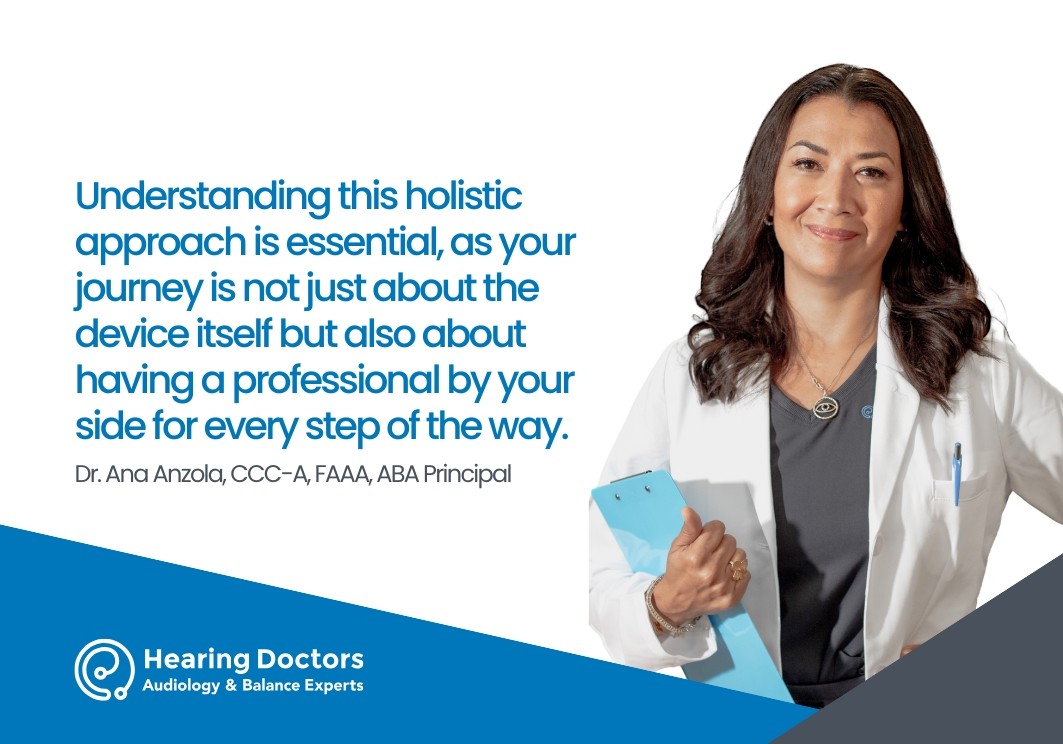Sep 13, 2021
Dr. Ana
Anzola, CCC-A, FAAA, ABA Principal
How High Stress Can Lead to Hearing Loss
You already know that excessive and prolonged amounts of stress can trigger a number of health issues. What you may not be aware of is the fact that high amounts of stress can have a negative impact on your hearing. This is especially true when the stress remains constant for an extended period of time. Learn about the impact that stress can have on the inner ear and why it may result in hearing loss.
The Basis for a Connection Between Hearing Loss and Stress
Ongoing stress is known to have physical repercussions as well as emotional ones. Stress temporarily changes the way that the body functions in order to deal with what’s happening. When the stress is sudden and traumatic, the changes continue until the episode passes. At that point, functions like breathing and circulation return to normal. If the stress is ongoing and high, there’s never the chance for those and other functions to revert to normal.
In other words, the body begins to lose the ability to recover from short bouts of stress. The result is an increased risk for a number of health issues. Along with cardiovascular issues, there can also be changes in the ability to hear.
The Key Has to Do With Circulation
All parts of the body need nutrition. The bloodstream is how those nutrients get where they need to go. In order for the blood to circulate, the circulatory system has to function properly. When it doesn't, some areas of the body will receive less than a healthy amount of nutrients. The result is a decrease in function and possibly permanent damage if the issue is not addressed within a reasonable amount of time.
How does this relate to hearing loss? Stress tends to narrow the vessels and reduce the efficiency of blood flow. That means the vessels to the inner ear are constricted and not capable of providing all the nutrition needed to remain healthy.
Specifically, the constriction that results from stress limits circulation to the sensory hairs found in the inner ear. Those hairs are essential in terms of translating sound waves entering the outer ear into electrical impulses that the brain can recognize and interpret. With inadequate circulation, they begin to weaken and wither. The result is that sounds may be muffled and seem to run together. You may not be aware of the sounds at certain decibel levels or frequencies at all.
Coping With Stress and Easing the Potential for More Inner Ear Damage
If stress has already caused some amount of hearing loss, it’s highly unlikely that you can get it back. What you can do is employ methods that help reduce stress, promote healthy blood flow, and minimize the risk of more damage being done to your hearing. It’s not unusual for audiologists to provide patients with some basic tips for protecting the hearing acuity that they have left.
One important approach is to carve out some time to give your mind and body a rest. Stepping away from the stress for as little as a half-hour can help lower blood pressure, allow the blood vessels to relax, and promote better circulation. Settle into a setting that is free of any stimulating noise or other aspects that would keep the stress high and allow yourself to enjoy some deep breathing. Along with easing the impact on your inner ear, this will also help with your general frame of mind.
Experts in audiology are also likely to recommend that patients engage in exercise that helps the heart to beat a little faster for a short time. Something as simple as a brisk walk for a half-hour can do wonders in terms of keeping the body in better condition. At the same time, that walk can be one way to let go of the stress that built up during the day. Easing the stress translates into easing the effects on the inner ear and preserving your remaining hearing capability.
Holding things in does not help alleviate stress. If there’s someone you can talk to about what’s happening, it’s all the easier to avoid some of the health complications associated with stress. That may be a trusted friend, a family member, or a counselor. While you’re not looking for solutions, talking about what’s causing the stress can help you sort through things in your own mind and feel less overwhelmed.
Meditation is another approach that can help ease the stress and provide protection for your ears. The nature of meditation does require withdrawing from what’s happening in your life for a short time and centering your mind on something that brings peace and order into your being. As you learn to meditate, it’s easier to become aware of your heart’s rhythm and the pace of your breathing. Your mind will also begin to relax and your blood flow will improve. That helps ensure your ears are getting the nourishment that they need to avoid further inner ear damage.
The Importance of Having Your Ears Checked
If you suspect that there is any amount of hearing loss due to stress or any other factor, it’s important to see an audiologist as soon as possible. A thorough examination of the ears along with a hearing test can determine what may be happening. In the best case scenario, it may not be too late to take action and preserve your hearing.
Keep in mind that stress isn’t likely to be named as the primary cause of hearing loss. What may happen is that the audiologist will recommend that you talk with your general practitioner about testing for high blood pressure and other issues that result from the stress. Bringing them under control may not restore whatever loss you’ve sustained, but it will certainly aid in hanging on to what remains.
Dealing With the Hearing Loss: Preparing to Wear a Hearing Aid
Depending on the degree of hearing loss, it may be in your best interest to wear a hearing aid. A professional can help you determine what sort is needed and tell you a bit about the features modern aids provide. Do expect to go through a period of adjustment as you begin to wear the hearing aid. Here are some tips that will help with the process.
Definitely choose a hearing aid that feels comfortable on as many levels as possible. A hearing aid that tucks behind the ear may work fine both in terms of comfort and being less obvious. You may also find some aids that fit into the outer ear are also comfortable enough for you to wear throughout the day.
Don’t be surprised if the professional recommends that you not wear the hearing aid around the clock. In fact, the advice may be to start off wearing the hearing aid when you are at home, then gradually branch out to wear it when you’re at work. The reason is that you’ve grown accustomed to a decreased level of hearing acuity. By providing yourself time to incrementally get used to the types of sounds that are around you in different settings, the change is less likely to be jarring.
There are classes you can attend to learn more about how to make the most of the hearing aid’s features, the proper way to care for the one you’ve selected, and even how to troubleshoot some of the hearing aid problems that may arise. Understanding your hearing aid and knowing when it’s time to take it in for maintenance is also important.
Your sense of hearing allows you to relate to the world around you. While there may not be much you can do to reverse the hearing loss, there are ways you can seek to prevent more from taking place. Do what can be done to alleviate and manage stress and there will be one less trigger that could cause more problems with your ability to hear.
Popular Blogs

Jun 3, 2025
Dr. Ana
Anzola, CCC-A, FAAA, ABA Principal
Understanding Types of Hearing Loss: Sensorineural, Conductive, and Mixed

May 21, 2025
Dr. Ana
Anzola, CCC-A, FAAA, ABA Principal
What Impact Is Artificial Intelligence Having on Hearing Aid Technology?

Apr 28, 2025
Dr. Ana
Anzola, CCC-A, FAAA, ABA Principal
Do You Think You’re Too Young for Hearing Loss?

Apr 15, 2025
Dr. Ana
Anzola, CCC-A, FAAA, ABA Principal
The Best Hearing Aids in 2025: Insights From a Doctor of Audiology


